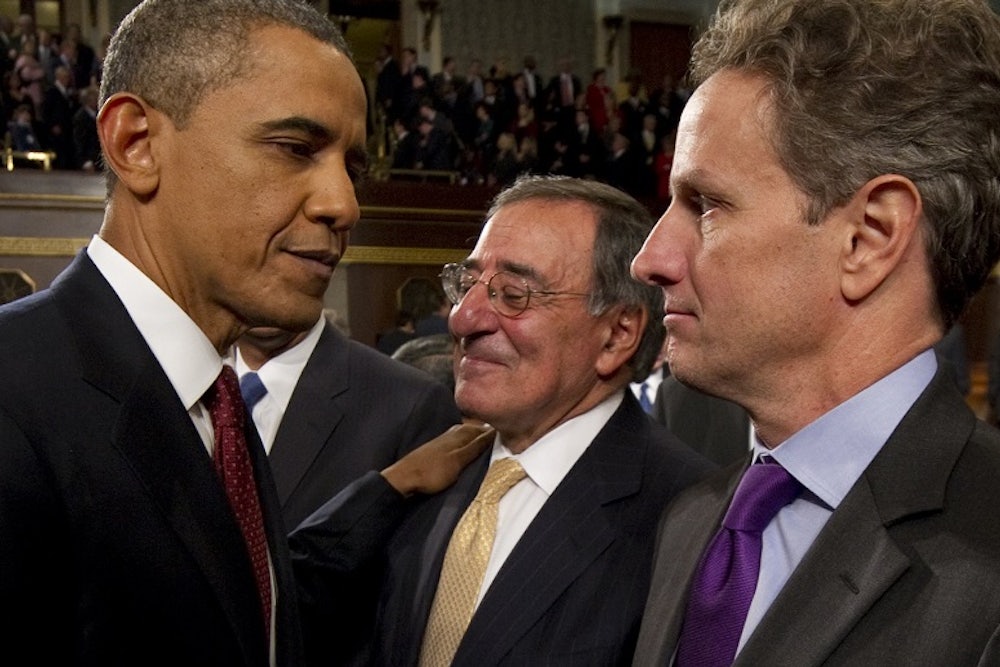On Wednesday, Vox’s Matt Yglesias argued that President Obama’s biggest economic failure has been his neglectful handling of the Federal Reserve. “This is a failure that sounds boring,” Yglesias writes, “but has likely doomed millions of people to needlessly long spells of unemployment.” It’s true that Fed policy has been too tight after the recession. But Yglesias both overestimates Obama’s ability to influence the Fed and ignores Obama’s actual biggest economic failure: housing policy.
First, the Fed. Yglesias is right that the Fed could have done much more to create stronger growth by, for instance, raising the inflation target above 2 percent or using NGDP targeting. But I’m not sure what Obama could have done much more to make that happen. The first challenge the president faced was actually getting 60 senators to confirm economists who supported looser monetary policy. In a follow-up article Thursday, Yglesias argues that Obama could have made a deal with Senate Republicans to accomplish that. “[I]f Obama had wanted to appoint pro-stimulus Federal Reserve governors, he could have gotten it done easily enough by agreeing to appoint some folks who agree with Republicans about other things,” he writes. That’s possible, but I think Yglesias underestimates the opposition Obama would have faced for any candidate that supported significantly higher inflation. Senator Rand Paul would have grilled those nominees and whipped up the conservative base. Maybe one or two would have been confirmed, but it’s hard to see how Obama could have consistently nominated dovish economists with Republican acquiescence.
Even if the Senate did confirm economists like Christina Romer or Scott Sumner, they would then have to actually change monetary policy. The Federal Reserve board has 12 voting members and works on a consensus basis. Romer and Sumner would certainly have given Chair Janet Yellen (and before her Ben Bernanke) room to loosen monetary policy. But Dallas Fed President Richard Fisher and Philadelphia Fed President Charles Plosser—both of whom are unnecessarily worried about inflation—would have the same amount of voting influence as Romer and Sumner. The addition of a few dovish economists just wouldn’t swing the consensus towards a significantly higher inflation target.
That doesn’t excuse Obama’s neglect. He should have paid much more attention to the Fed and nominated Romer for the board. It may not have made a huge economic difference, but it would have made some.
But Obama’s neglect of monetary policy pales in comparison to his housing policies. Economists Amir Sufi and Atif Mian convincingly argue in their book House of Debt that consumers significantly reduced their spending after the Great Recession as millions of them suddenly found themselves underwater—meaning their home was worth less than their loan. This was and continues to be a major impediment to stronger economic growth.
So, how could Obama have made this better? By putting someone at the head of the Federal Housing Finance Agency (FHFA) who would have approved his plan to offer debt relief to underwater homeowners. The FHFA runs Fannie Mae and Freddie Mac, which hold millions of loans in America that are underwater. For years now, housing advocates have implored the agency to write down the principal for these troubled homeowners. Once they were no longer underwater, the homeowners could refinance their loans at today’s low interest rates. Economist Glenn Hubbard calculated in 2012 that principal reduction could lead to $70 billion a year in savings—an average of $2,800 per homeowner.
But that hasn’t happened. Treasury Secretary Tim Geithner sent a letter to FHFA acting director Ed DeMarco in 2012 asking him to support principal reducion. But because DeMarco shot down the proposal, because he was concerned about the costs to the agency. When that happened, Obama should have fired DeMarco and replaced him with someone willing to implement principal reduction.1 Bafflingly, though, Obama let DeMarco serve for another year and a half. Mel Watt took over for him in January, but has not allowed principal reduction either.
The administration could have done other things on housing too, such as pushing Congress to modify the bankruptcy code to allow cramdowns. Cramdowns allow bankruptcy judges to modify the terms of a loan to make it easier for the borrower to pay off. Obama supported cramdowns, but didn’t lobby Congress particularly hard on the issue. That may not have mattered. After all, Senate Republicans opposed cramdowns and likely would have blocked them no matter what. (That’s Yglesias’s position.) But the administration still didn’t put much effort into it. David Dayen, writing in the Fiscal Times, explains why other Obama-era housing programs failed to live up to expectations as well.
Helping the housing market would have spurred stronger growth and set off the positive, political feedback loop that Yglesias describes in his original piece. “A speedier turnaround would also have meant a more popular administration, whose party would have done better in the 2010 and 2012 midterms and thus had more latitude to pursue its legislative preferences,” he writes. Paying more attention to the Federal Reserve would have helped that. But better housing policies would have helped even more.
The FHFA director must be confirmed by the Senate, which would’ve been a difficult task. This was before Senate Democrats want nuclear and eliminated the filibuster for executive branch nominations and judicial appointments (non-Supreme Court). But Obama could have used a recess appointment to install a replacement as he did with the National Labor Relations Board and Consumer Financial Protections Bureau.
Update: I added in a sentence and link to David Dayen's work.
